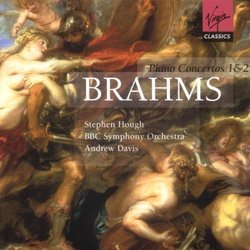| All Artists: Johannes Brahms, Andrew Davis, BBC Symphony Orchestra, Stephen Hough Title: Brahms: Piano Concertos 1 & 2 Members Wishing: 0 Total Copies: 0 Label: Virgin Classics Release Date: 5/5/1998 Genre: Classical Styles: Forms & Genres, Concertos, Instruments, Keyboard, Symphonies Number of Discs: 2 SwapaCD Credits: 2 UPCs: 724356141223, 724356141254 |
Search - Johannes Brahms, Andrew Davis, BBC Symphony Orchestra :: Brahms: Piano Concertos 1 & 2
 | Johannes Brahms, Andrew Davis, BBC Symphony Orchestra Brahms: Piano Concertos 1 & 2 Genre: Classical
|
Larger Image |
CD Details |
CD ReviewsI admire Hough more than anyone, but... Hough Fan | 11/21/2004 (2 out of 5 stars) "I notice Stephen Hough doesn't show this disc (nor his early Virgin Liszt) on his website discography. I think he's well aware of the weaknesses in these early recording efforts. These recordings, along with his dreadful Brahms violin sonatas with Robert Mann are truely to be taken parenthetically, because in most everything he has touched since, he's pure magic. Brahms once said that his music was frequently played "too fast." Hough and Davis seem to have taken this admonition to heart, although to an extreme and unsatisfactory conclusion. Both concerti lack lyrical sweep and whimsy, with phrases stretched beyond the breaking point by the thick approach. The music sounds stuck in the mud. Aside from the mired, pedantic character, the recording quality and performance of the orchestra are awful! Intonation and ensemble are on the par of a good community orchestra...a sad collaboration with such a promising pianist. I do hope Stephen Hough revisits these concerti in a future recording. He is truly brilliant and just gets better and better. His new Rachmaninoff set is out of this world." Good introduction, but no ecstacy here hjonkers | The Netherlands | 07/07/2004 (3 out of 5 stars) "These early digital recordings do not show Stephen Hough's artistry at its best. There is much to admire in his rhetoric abilities, but during these sessions (when he was in his twenties) they still were in a stage of development. Sure, his tone quality is already exemplary and his technique stellar, but I don't think Hough already possesses the variety of colours and the harmonic tension to bring these two piano concertos off completely convincingly. I'd say he relies too much on that leonine, sonorous sound quality (which the other reviewers here praise so much), while forgetting to really adapt to the character and sphere of each particular movement of the two concertos. His partner in these, Andrew Davis' BBC Orchestra, is quite unconvincing overall: their way with both works is quite businesslike and never reaches the edge-of-your-seat-excitement that accompanists like Szell, Haitink or Abbado could create. Hough's strength in the D minor concerto is formidable, but he sounds quite loose and uninterested--where is the fury? It's not there - take the first entry of the piano; Hough seems to care mainly about his style and forgets about the necessary tension. The great climaxes are still exciting from Hough's side, but his orchestral partners leave me indifferent. The B flat, especially the first movement, is too slow: in a faster, more energetic and exciting account Hough would have made more impression. As it comes now, he is no match for a pianist like Anda (in his majestic performance with Fricsay, on DG) who maintains a similarly slow pace. After a while, Hough's phrasing gets boring at this slow tempo. Again he does not completely identificate with the work - he plays the final rondo as though it is exactly the same thing as the first movement. Worse is that I don't get any particularly positive impression of the BBC team; it's dragging and uninteresting. These recordings may not be really bad after all, and are certainly valuable introductions, but we're talking about Brahms' two piano concertos here, about the greatest compositions ever made for piano and orchestra. Why should you be satisfied with collaborations that never really touch the summit of interpretation? There are enough available that do - Fleisher or Serkin/Szell, Gilels/Jochum, Brendel/Abbado and a whole lot of others. This is just a good first set." Great recording Brent S. | San Francisco, CA | 03/22/2005 (5 out of 5 stars) "I like these recordings for a number of reasons. First, neither Davis nor Hough let the romanticism of the works take control; they push the limits of the tempo changes and crescendos/decrescendos without making them too abrupt. The effect seems to make the works too flat for some of the earlier reviewers, but I think it works well.
Second, Hough understands the changing role of the piano to near perfection. The first concerto famously uses the piano as almost a part of the orchestra rather than in the traditional solo role. In the second concerto the balance is equally important, as so many of the emotional peaks of the work depend on shifts of emphasis between piano and orchestra. Hough maneuvers these changes well, knowing when to rise above the accompaniment and when to fade into it. The effect in both concertos is wonderful. Last (but definitely not least), the sound quality is fantastic. The engineer did a good job of capturing a full range of both piano and orchestra. Both works sound great through headphones and big speakers alike, and at any volume. These recordings are excellent in so many regards. Given their quality (and surprisingly low price), you can't go wrong." |

 Track Listings (3) - Disc #1
Track Listings (3) - Disc #1